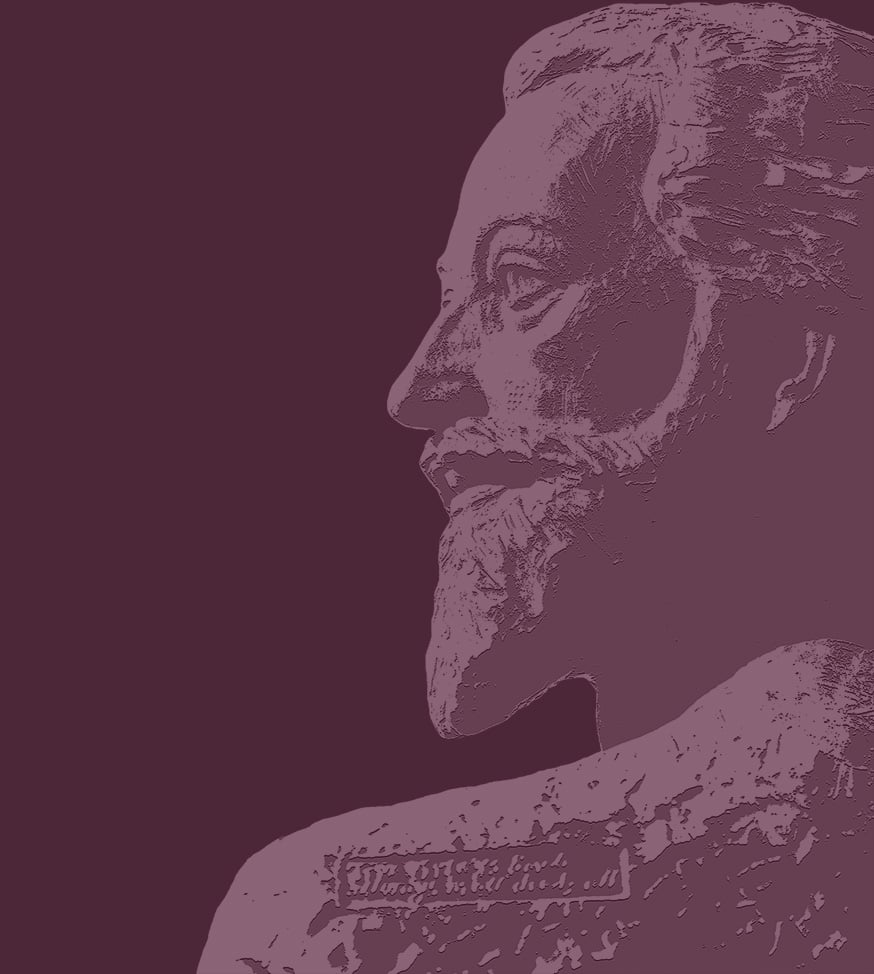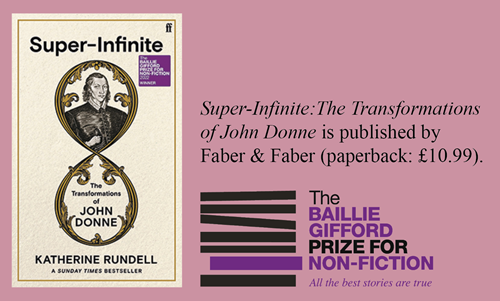
Photography by David Vintiner
This article originally featured in Baillie Gifford’s Spring 2023 issue of Trust magazine.
Katherine Rundell’s childhood in Zimbabwe was the stuff of dreams. School finished at midday, after which she’d head outside to climb trees and build rafts. She also loved reading, something her parents encouraged. They’d pin poems next to the bathroom sink and pay her a few cents for each one she learned by heart.
One poem that captured her imagination was Go and Catch a Falling Star, which sparked a lifelong passion for John Donne. Reciting it, she brings the fantastic imagery to life:
Go and catch a falling star,
Get with child a mandrake root,
Tell me where all past years are,
Or who cleft the devil’s foot.
Rundell wants to share her passion for Donne. She describes Super-Infinite: The Transformations of John Donne as “both a biography and act of evangelism”.
“I wanted to write something that would be gripping enough to take hold of people by the wrist, even those who perhaps wouldn’t think they could be interested in John Donne, and pull them through his life,” Rundell explains. “My hope was that they would finish the book and immediately go and find his poetry.”
Place of worship
We meet in the crypt at St Paul’s Cathedral, where the poet preached for the final decade of his life. The sound of a choir singing evensong floats through the circular grates above us. As the last tourists and worshippers leave the building, mice come out and scuttle across the stone floor of the cavernous chamber.
I ask Rundell to take us back 400 years to the days of Donne.
“The cathedral was, of course, a place of devotion and worship, but it was also loud and busy – a place to display your newest hats and coats,” she explains. “It was said that if you wanted to get the latest fashion, you’d take your tailor there, and you’d be able to get the perfect suit copied from one of the exquisitely clad men parading their elegance around the church.”
It was also unruly. “You could climb up the roof to etch your initials into the soft lead. Young gallants with spurs on their boots walked through the cathedral, chased by choirboys who would fine them for wearing spurs. And there are accounts of little boys peeing on the floor and then skating along it like an ice rink.”
For many, the draw was the Rev Dr Donne. He would often weep at the pulpit in sorrow or joy. And sometimes he’d preach outside the cathedral, and crowds of between 1,000 and 6,000 stretching back to the River Thames gathered to hear or at least observe him. His sermons would last up to three hours but weren’t “a laborious process of holiness”, Rundell says.
“His sermons were often the most fascinating moment of your week. They would include bold religious insight, news of Europe, news of wars, propaganda, jokes, new religious angles and references to poets. And Donne was the finest. The one people came to see.”
But the Dean of St Paul’s is far better remembered as a poet in an era when poetry was central to cultural life, alongside theatre and music. This was before the days of novels and newspapers. Poems were treasured, folded into small pieces and passed from hand to hand.
“It would have been incredibly rare to be an educated man and not write poetry. Everyone tried it. Everyone wrote sonnets,” explains Rundell. They didn’t just use poetry for courtship but to make friends and enemies, undermine the monarchy, explain God and explore death.
A famous contemporary
Donne’s poetry is famously tricky to master. In contrast to Shakespeare, his contemporary whose dramatic poetry thrilled the masses, Donne wrote poems for his elite circle. There’s no evidence the two met, but given Donne’s love of theatre there’s a chance they brushed shoulders at the Globe Theatre or in the many taverns that lined the Thames.
Donne’s verses may be harder to disentangle but are potentially just as rewarding, says Rundell. His poetry “requires your focus, care and attention, and a degree of excessive intellectual strain”, she says. “But in return it’s like cracking a safe, and there is gold inside, and it’s gold that will last.”
More than just a poet
1572: Born in London
1592: Trains in law, becoming Master of Revels at Lincoln’s Inn
1596: Joins British naval expedition to fight against Spain
1598: Secretary to the Lord Keeper of the Great Seal
1601: MP for Brackley in Northamptonshire
1602: Jailed in Fleet Prison for marrying Anne More
1614: MP for Taunton, Somerset
1615: Becomes chaplain to King James I
1616: Reader in Divinity at Lincoln’s Inn
1619: Travels to Germany as chaplain to the King’s ambassador
1621: Dean of St Paul’s Cathedral
1624: Vicar of St Dunstan-in-the-West in Fleet Street
1631: Dies aged 59 and is buried at St Paul’s
1633: First poetry collection is published
This is typical of the vivid imagery Rundell conjures up for her readers. My mind drifts to the highlander’s sgian dubh when she says in her book that the poet “wanted to wear his wit like a knife in his shoes; he wanted it to flash out at unexpected moments”. And she describes reading a Donne sermon as “a little like mounting a horse only to discover that it is an elephant: large and unfamiliar”.
Rundell brings the Renaissance poet to life as if he were still with us. A couple of times during the interview she pauses between sentences and says: “I love Donne.”
She describes him as the finest writer of love poetry in the English language because he broke with convention at a time when others described women as flowers, roses and doves. Instead, Donne was gleeful, lustful and explicit when writing about sex. His poem To His Mistress Going to Bed is an example:
Licence my roving hands, and let them go,
Before, behind, between, above, below.
O my America! my new-found-land,
My kingdom, safeliest when with one man mann’d
So did he enact the wild sexual abandonment his poetry celebrates? “Probably, he would have had dalliances with women,” speculates Rundell. “But the great love poet of the period is very unlikely to have been the great Lothario working his way through swathes of the female glories of London. That’s unlikely.”
Women of his class were carefully protected at the time because pregnancy out of wedlock could lead to ostracism. And his Catholic roots probably limited his prospects, despite his conversion to Protestantism in his twenties. It’s hard to overstate how hard it was growing up as a Catholic in England at the time.
Former Archbishop of Canterbury Rowan Williams says that back then Catholics were regarded as many in the west now see Islamic State or al-Qaida.
Coined by Donne
John Donne is credited with inventing about 340 words in the Oxford English Dictionary. They include:
- Emancipation
- Apprehensible
- Beauteousness
- Bystander
- Commonplacer
- Criminalist
- Enripen
- Horridness
- Jig
- Unperplex

Donne was more than just a poet and preacher. He was one of the greatest polymaths of his age: a lawyer, pirate, politician and diplomat. In her book, Rundell chronicles his swashbuckling journey from Bread Street birth to burial a stone’s throw away at St Paul’s.
The tales of derring-do include fighting the Spanish at the Battle of Cadiz in 1596. There’s tragedy too. His brother died from bubonic plague in Newgate Prison after being arrested for harbouring a Catholic priest, and Donne’s wife, Anne, died shortly after childbirth following her 12th labour, aged just 33.
Donne was undoubtedly an original, and Rundell says he deserves a place in our hearts and on the curriculum. “He isn’t so impenetrable that you can’t fall in love with him at 14 or 15 or 20,” she argues. “He’s got mischief and spikes of great wit. It is good to put children in the presence of a burning original so they know what is possible.”
As one of our best-selling children’s authors, she should know. The Oxford don, a Fellow of All Souls College, is an extraordinarily diverse writer. Her most recent book, The Golden Mole, is an illustrated compendium of pangolins, narwhals and other endangered animals. And her talents and interests extend to night climbing and tightrope walking, which she describes as “a continuation of childhood joy”.
That same childhood saw her fall in love with Donne. Her book invites us to do the same.

Important information
Baillie Gifford & Co and Baillie Gifford & Co Limited are authorised and regulated by the Financial Conduct Authority (FCA). Baillie Gifford & Co Limited is an Authorised Corporate Director of OEICs.
Baillie Gifford Overseas Limited provides investment management and advisory services to non-UK Professional/Institutional clients only. Baillie Gifford Overseas Limited is wholly owned by Baillie Gifford & Co. Baillie Gifford & Co and Baillie Gifford Overseas Limited are authorised and regulated by the FCA in the UK.
Persons resident or domiciled outside the UK should consult with their professional advisers as to whether they require any governmental or other consents in order to enable them to invest, and with their tax advisers for advice relevant to their own particular circumstances.
Financial intermediaries
This communication is suitable for use of financial intermediaries. Financial intermediaries are solely responsible for any further distribution and Baillie Gifford takes no responsibility for the reliance on this document by any other person who did not receive this document directly from Baillie Gifford.
Europe
Baillie Gifford Investment Management (Europe) Ltd (BGE) is authorised by the Central Bank of Ireland as an AIFM under the AIFM Regulations and as a UCITS management company under the UCITS Regulation. BGE also has regulatory permissions to perform Individual Portfolio Management activities. BGE provides investment management and advisory services to European (excluding UK) segregated clients. BGE has been appointed as UCITS management company to the following UCITS umbrella company; Baillie Gifford Worldwide Funds plc. BGE is a wholly owned subsidiary of Baillie Gifford Overseas Limited, which is wholly owned by Baillie Gifford & Co. Baillie Gifford Overseas Limited and Baillie Gifford & Co are authorised and regulated in the UK by the Financial Conduct Authority.
South Korea
Baillie Gifford Overseas Limited is licensed with the Financial Services Commission in South Korea as a cross border Discretionary Investment Manager and Non-discretionary Investment Adviser.
Japan
Mitsubishi UFJ Baillie Gifford Asset Management Limited (‘MUBGAM’) is a joint venture company between Mitsubishi UFJ Trust & Banking Corporation and Baillie Gifford Overseas Limited. MUBGAM is authorised and regulated by the Financial Conduct Authority.
Australia
Baillie Gifford Overseas Limited (ARBN 118 567 178) is registered as a foreign company under the Corporations Act 2001 (Cth) and holds Foreign Australian Financial Services Licence No 528911. This material is provided to you on the basis that you are a “wholesale client” within the meaning of section 761G of the Corporations Act 2001 (Cth) (“Corporations Act”). Please advise Baillie Gifford Overseas Limited immediately if you are not a wholesale client. In no circumstances may this material be made available to a “retail client” within the meaning of section 761G of the Corporations Act.
This material contains general information only. It does not take into account any person’s objectives, financial situation or needs.
South Africa
Baillie Gifford Overseas Limited is registered as a Foreign Financial Services Provider with the Financial Sector Conduct Authority in South Africa.
North America
Baillie Gifford International LLC is wholly owned by Baillie Gifford Overseas Limited; it was formed in Delaware in 2005 and is registered with the SEC. It is the legal entity through which Baillie Gifford Overseas Limited provides client service and marketing functions in North America. Baillie Gifford Overseas Limited is registered with the SEC in the United States of America.
The Manager is not resident in Canada, its head office and principal place of business is in Edinburgh, Scotland. Baillie Gifford Overseas Limited is regulated in Canada as a portfolio manager and exempt market dealer with the Ontario Securities Commission (‘OSC’). Its portfolio manager licence is currently passported into Alberta, Quebec, Saskatchewan, Manitoba and Newfoundland & Labrador whereas the exempt market dealer licence is passported across all Canadian provinces and territories. Baillie Gifford International LLC is regulated by the OSC as an exempt market and its licence is passported across all Canadian provinces and territories. Baillie Gifford Investment Management (Europe) Limited (‘BGE’) relies on the International Investment Fund Manager Exemption in the provinces of Ontario and Quebec.
Israel
Baillie Gifford Overseas Limited is not licensed under Israel’s Regulation of Investment Advising, Investment Marketing and Portfolio Management Law, 5755–1995 (the Advice Law) and does not carry insurance pursuant to the Advice Law. This material is only intended for those categories of Israeli residents who are qualified clients listed on the First Addendum to the Advice Law.
37212 10019434




